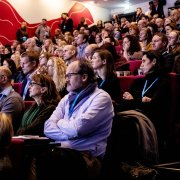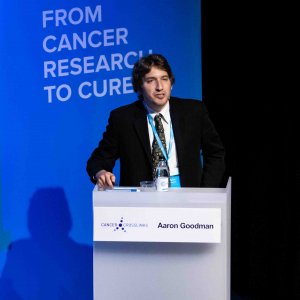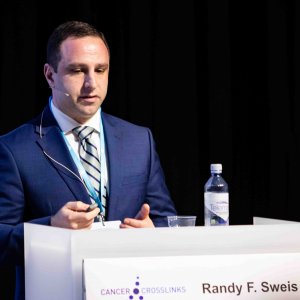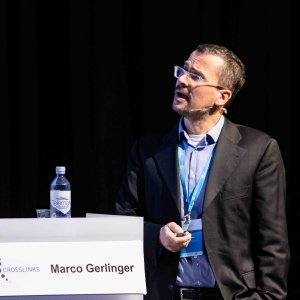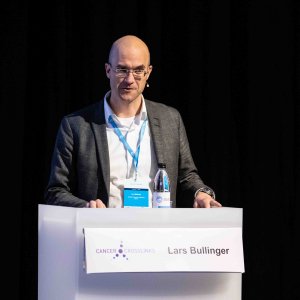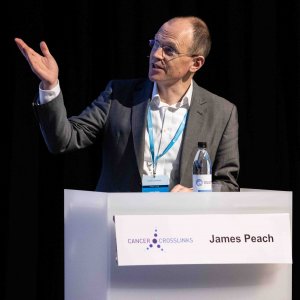Top presentations from Cancer Crosslinks 2019
See them again or for the first time: videos from the Cancer Crosslinks 2019 presentations.
Cancer Crosslinks is Oslo Cancer Cluster’s annual, open conference for the Norwegian oncology community. It offers a full-day educational program featuring distinguished international and national experts presenting recent advances in precision oncology and cancer immunotherapy.
More than 300 participants joined Cancer Crosslinks on 17 January 2019 and enjoyed excellent talks and discussions presented by leading international oncologists and researchers and their Norwegian colleagues.
The speakers’ top topics
The speakers discussed new insights into sensitivity and resistance and features of the tumour microenvironment critical for the clinical course. They also discussed emerging tissue agnostic biomarkers, where «tissue agnostic” refers to the ability to develop therapies based upon biomarkers or other molecular targets to treat a disease. A biomarker is a measurable indicator of a biological state or condition.
Other topics were learnings from cancer molecular evolution studies, and how big data approaches are used to improve patient care. Together with an engaged audience, the presenters were really connecting the dots for improved patient care in precision oncology.
Professor Naiyer Rizvi, Director of thoracic oncology and of immunotherapeutics for the division of haematology and oncology at Columbia University Medical Center, New York, gave the opening keynote in the form of a video presentation. He is an internationally recognized leader in the treatment of lung cancer and immunotherapy drug development.
In his presentation, titled: “Sensitivity and resistance to immuno-oncology: Biological insights and their translation into precision treatment”, Prof. Rizvi also addressed the question “What happens when the doctors expect the patient to respond to immunotherapy, but then the patient does not?”
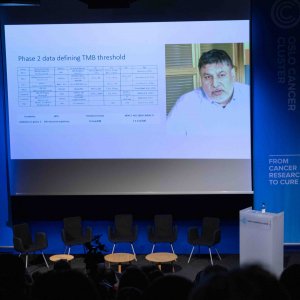
Dr. Aaron Goodman, MD, is a haematologist and medical oncologist specialized in treating a variety of blood cancers. He holds a position as Assistant Professor of Medicine at the Moores Cancer Center at UC San Diego Health in La Jolla, California.
During his talk, Dr. Goodman presented tumour mutational burden and other emerging tissue agnostic biomarkers for response to cancer immunotherapy and how to implement these into the clinic. He also spoke about his experience from the Rare Tumour Clinic in San Diego, where they perform a comprehensive molecular profiling for about 22-25% of cancer patients with rare tumours. The goal is to identify a matching therapy for each patient.
After his presentation, Dr. Goodman commented to Oslo Cancer Cluster:
“We started by doing data collections and help patients and learn at the same time. It is a benefit that we at least have the patient’s data and experience with that patient so that we can go forward and help the next patient.” Aaron Goodman
Dr. Randy F. Sweis is an Assistant Professor in the haematology/oncology section at the University of Chicago. He works with cancer immunology, developmental therapeutics and biomarkers, with a clinical interest in phase 1 clinical trials and genitourinary malignancies. His laboratory research involves the identification and targeting of tumour-intrinsic immunotherapy resistance pathways.
During Cancer Crosslinks, Dr. Sweis presented his work on immunophenotypes: “The T cell-inflamed tumour microenvironment as a biomarker and its clinical implications.”
Dr. Marco Gerlinger is a clinician scientist at the Center for Evolution and Cancer at the Institute of Cancer Research in London and a consultant Medical Oncologist in the GI Cancer Unit at Royal Marsden Hospital. He develops novel techniques to detect and track intra-tumour heterogeneity in solid tumours to define evolutionary plasticity and common evolutionary trajectories in cancers. Cancer cell plasticity is the ability of cancer cells to change their physiological characteristics.
Dr. Gerlinger shared the latest insights into cancer evolution and discussed the limits of predictability in precision cancer medicine. How can clinicians and researchers exploit important data on tumour development?
During his visit in Oslo, Dr. Gerlinger commented: “We have had fantastic discussions with an audience that is really well informed and brings up the challenges we are facing and the research we are doing.”
“This is the first time I have given a talk in Norway and obviously there is a lot going on here. I am already thinking about some collaborations, because there are some interesting advantages here through big tumour banks and cancer registries.” Dr. Marco Gerlinger
Professor Dr. med. Lars Bullinger is Professor of Hematology and Oncology and Medical Director of the Department of Hematology, Oncology and Tumor Immunology at Charité University Medicine Berlin.
He is a partner in the Innovative Medicines Initiative project HARMONY (Healthcare alliance for resourceful medicines offensive against neoplasms in haematology) aiming to use big data to deliver information that will help to improve the care of patients with haematologic cancers.
In his keynote speech he presented the “best of hematology from 2018” to the Cancer Crosslinks audience. He also addressed emerging therapeutic opportunities and the impact of big data for precision treatment in haematology.
WATCH PROF. DR. MED. LARS BULLINGER
James Peach is the Precision Medicine Lead at UK Medicines Discovery Catapult, Alderly Park, UK. Prior to this role, he was the Managing Director at the main programme for Genomics England from 2013 to 2017. He presented his perspectives on the implementation of precision medicine in the UK and discussed the status, lessons learned and the way forward.
The expert panel
You can read more about how the Norwegian expert panel reacted to James Peach’s presentation and the state of precision medicine in Norway in the article below, also from Cancer Crosslinks 2019. The article contains a video of the panel debate.
Getting genomics into healthcare: look to the UK

